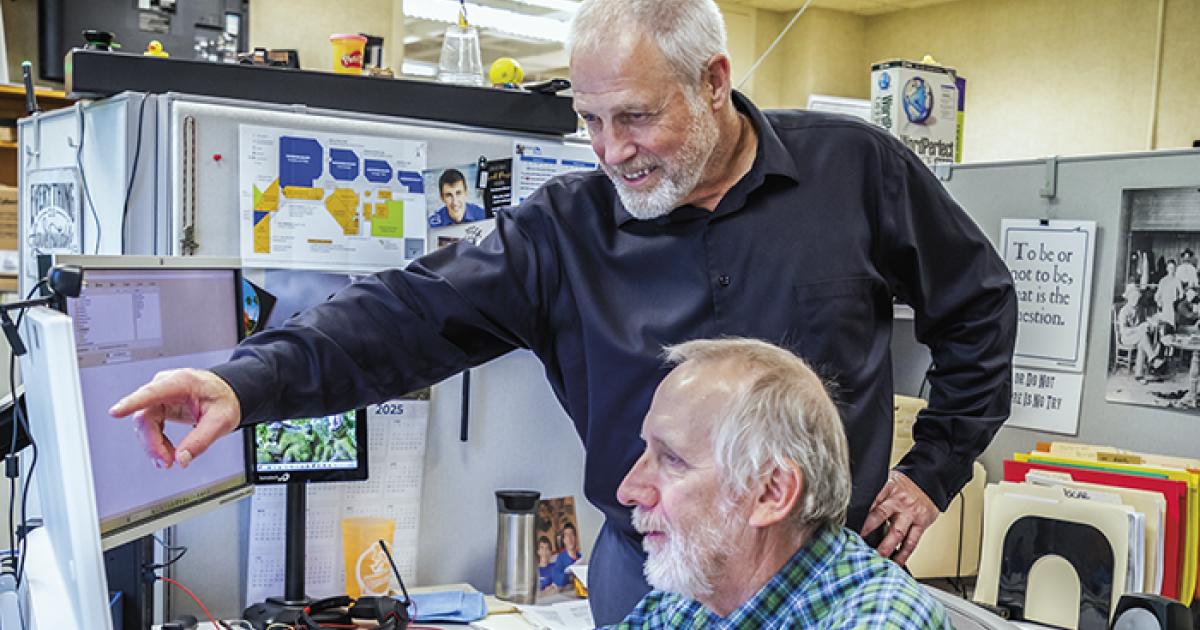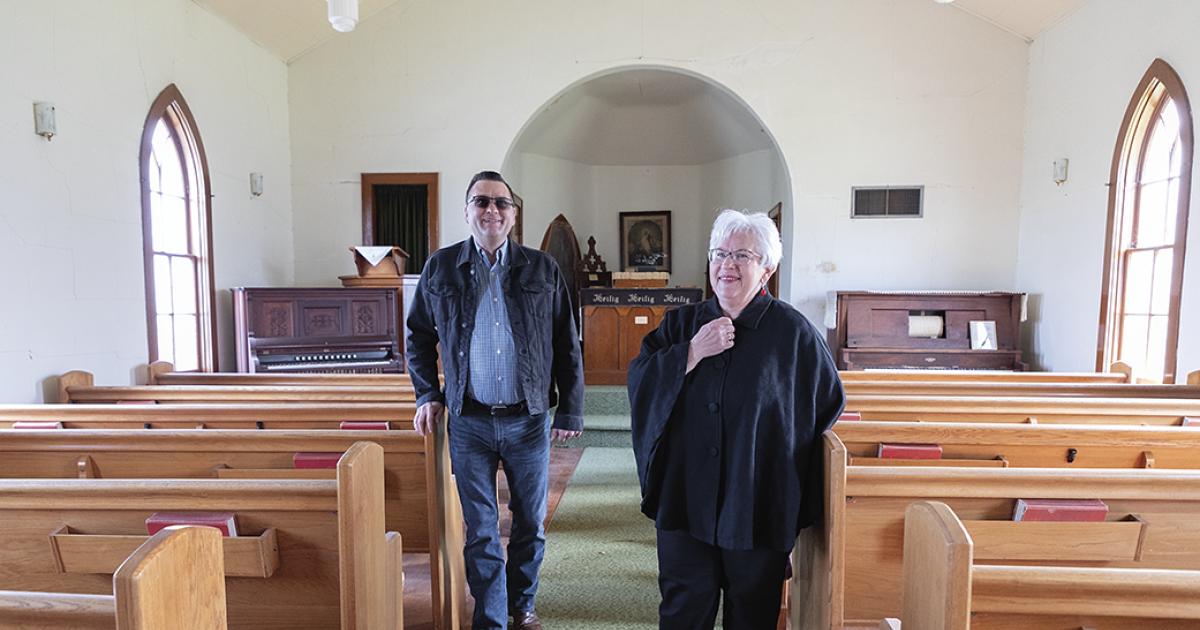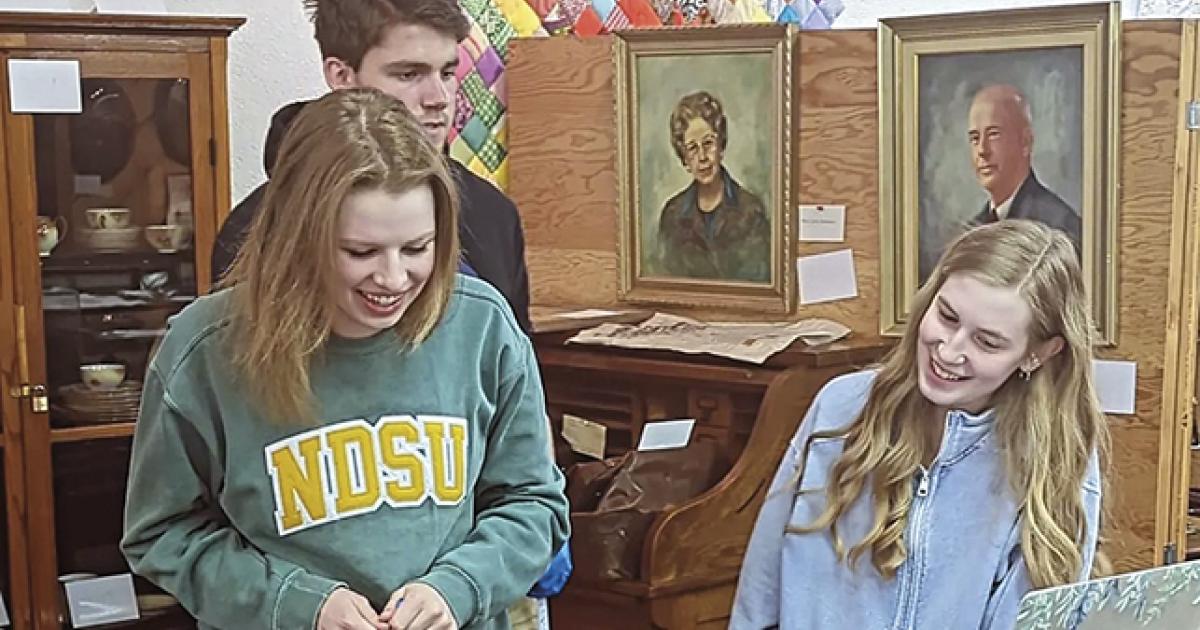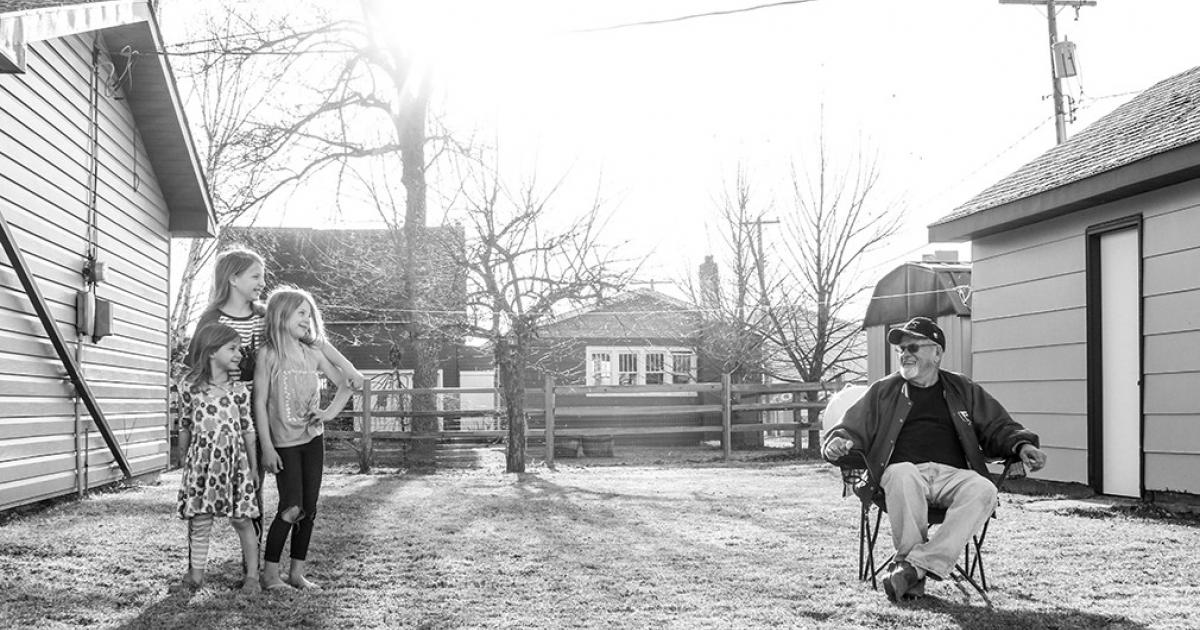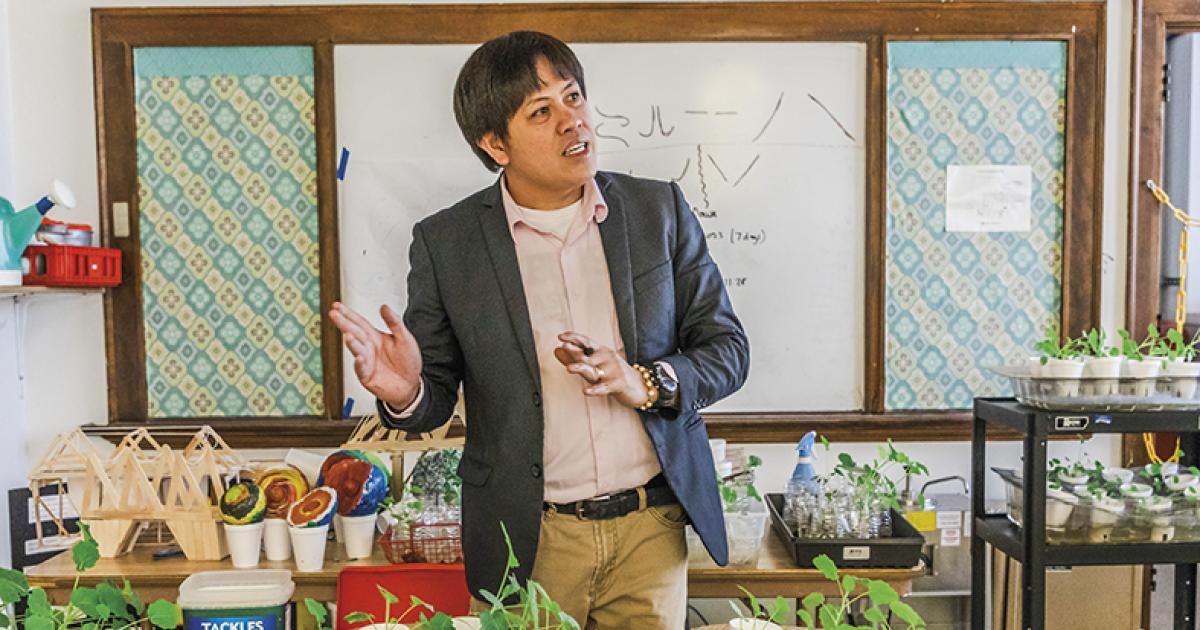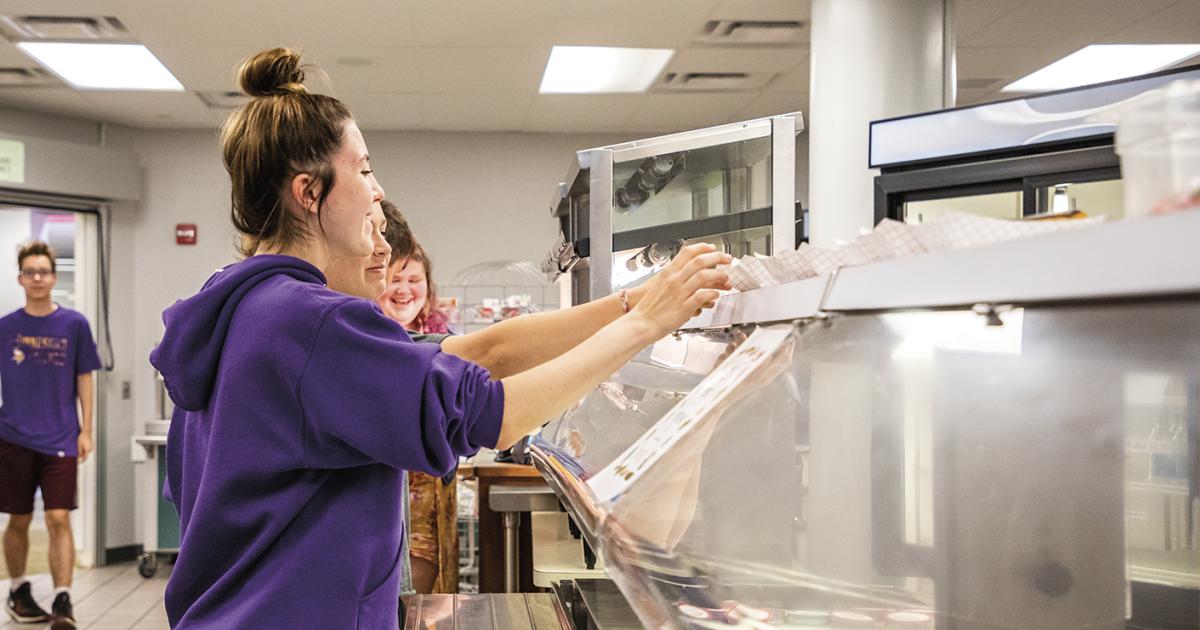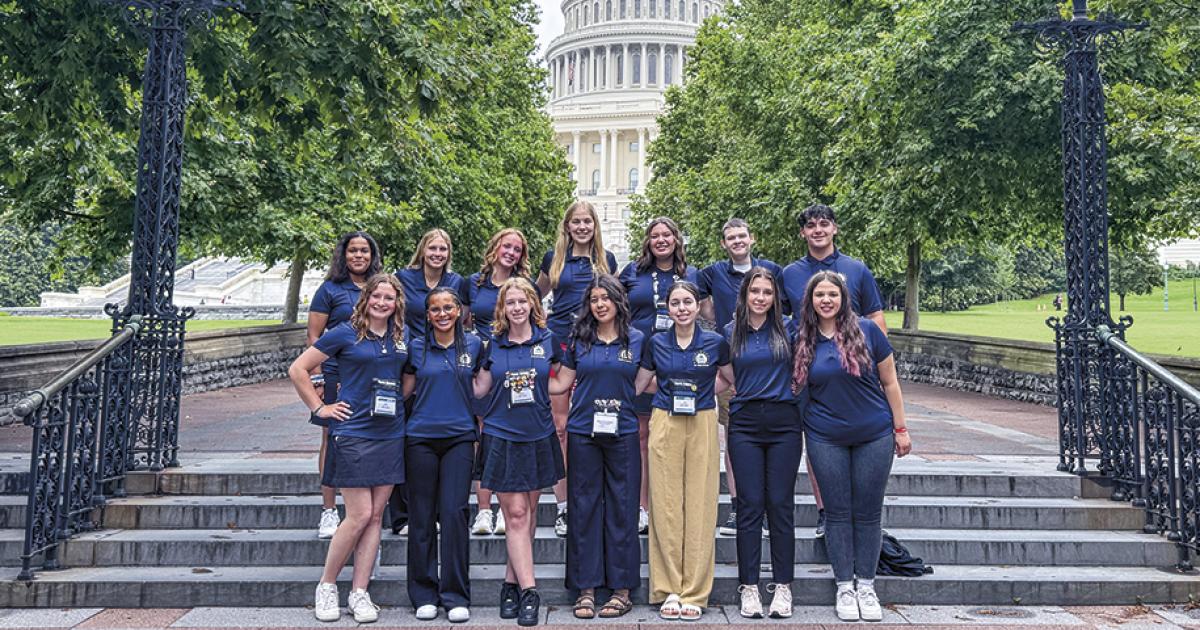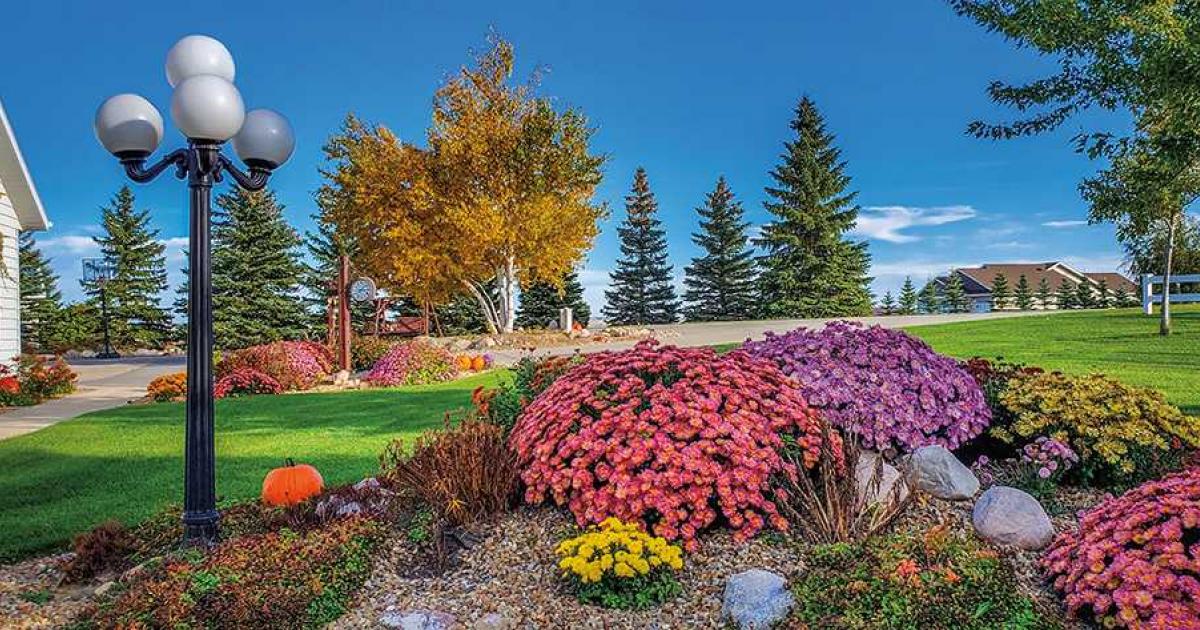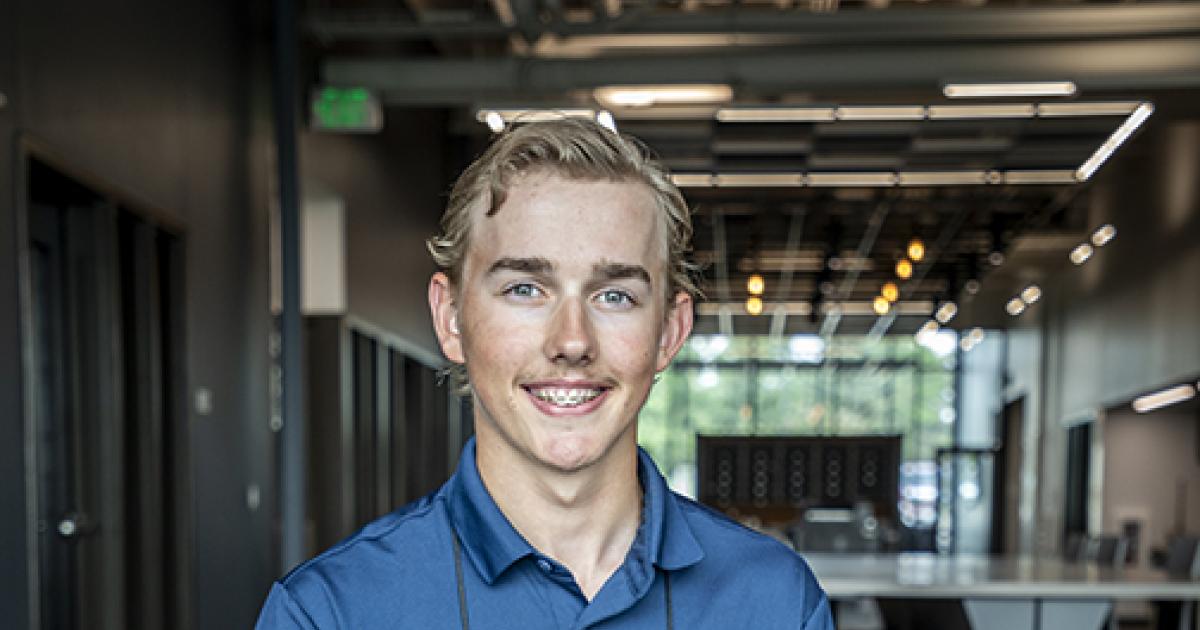McIntosh County first to demo digital museum cataloging project
With the help of State Historical Society North Dakota (SHSND) IT Manager David Mayer, seated, Dale Lennon, SHSND Foundation executive director, hopes to offer a free collections management software to local heritage centers and museums. Photo by NDAREC/Liza Kessel
While a shared love of history and desire to preserve it for future generations called Marvel Gross and Randy Woehl to serve on the board of the McIntosh County Heritage Center, a question from their county auditor propelled them toward an incredible opportunity for their local museum.
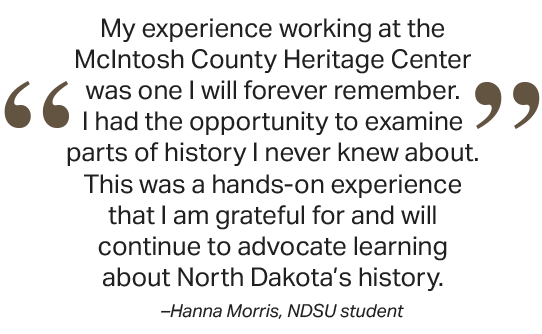
The McIntosh County auditor asked the heritage center for an inventory of its contents. None existed, nor were there enough volunteers to string together to accomplish a museum cataloging effort.
Woehl contacted Lindsay Meidinger at the State Historical Society of North Dakota (SHSND) for help, and she connected him to Dale Lennon at the SHSND Foundation.
“I have just the perfect thing for that,” Woehl recalls Lennon saying after explaining the situation in McIntosh County.
In December 2022, Lennon pitched a pilot program to local museums to implement a digital cataloging system with help from the foundation, but there were no takers.
The SHSND was already using collections management software, which digitized every aspect of its collections and archives all in one place. The software offered both internal and public facing advanced search options, the ability to include a photo and description of each item, and provided a space to tell each item’s story, including how it was acquired. The biggest appeal, however, was the ability to share collections and archives across the globe through the internet.
“The whole purpose is to make (local museums and their collections) available to the world,” Lennon says. “The attraction is it becomes searchable. Maybe a museum in New York City is looking for something that’s truly authentic that they don’t have, and they come across this piece. There’s no reason why you can’t loan that artifact out, and that’s what museums do.”
Having a searchable database makes local museums accessible to all kinds of people: potential visitors, academics, genealogists, historians, museum curators and regular internet users.
Woehl was sold.
In November 2023, Woehl and Gross made contact with Dr. Thomas Isern of North Dakota State University (NDSU) at a Tri-County Tourism Alliance meeting. Isern was interested in the McIntosh County project. As a history professor, he could also help solve the manpower issue with his NDSU students.
“How quickly can we make this happen?” Woehl asked.
As it turns out, fairly quickly. With the software available and the right people in place, Isern brought his history students to McIntosh County in March and April to catalog the heritage center’s collection. Over the course of two weekends, the NDSU students were able to catalog about 70% of the museum’s items on display. When complete, the entire McIntosh County Heritage Center collection will be viewable online from anywhere in the world.
“The value is more exposure than the people that live here,” Woehl says. “We now have not just regional exposure, we have state, we have national, we have worldwide (exposure), because we are going to have this placed on the web. We now have world exposure – what we have, what our history is and more than just putting an item in, putting a story with it. Doing that, of course, preserves it forever, because as we’ve found out, these people die off and the story’s gone.”
PILOTING THE PROJECT
With Lennon and his partners at the SHSND and Isern and his NDSU history students on board, Woehl and Gross rallied local support. The Wishek family paid for the students’ lodging at the historic Ashley Lodge, and the local Lions Club helped with meals. NDSU helped fund the students’ transportation and some meals. Expenses totaled about $6,000 to $7,000 to host the students in Ashley, Woehl says.
“Altogether, we got community involvement and university support to pay for this, so it was zero cost to the taxpayer,” he says.
And McIntosh County got to show off its small-town charm.
Students toured Grandma’s Kuchen, ate at the local Wild Rose Café, marveled at Marvel’s German pickles and pickled watermelon, and consumed the history and German-Russian heritage of the region.
The students received instruction on museum cataloging from Isern and SHSND staff, then were placed in areas of interest throughout the museum. Working in teams, the students cataloged whole collections, like textiles and military, requiring them to identify, measure and photograph the items, then input them into a spreadsheet. The data and photographs will ultimately be uploaded to the internet using the collections management software and housed on the SHSND website.
“(The students) wanted the history. They wanted to get right into it. The questions didn’t stop. Marvel and I were running back and forth to answer questions. They wanted to know more,” Woehl says. “To have that interest is something you can’t place a dollar value on to preserve our history.”
“My experience working at the McIntosh County Heritage Center was one I will forever remember. I had the opportunity to examine parts of history I never knew about. This was a hands-on experience that I am grateful for and will continue to advocate learning about North Dakota’s history,” NDSU student Hanna Morris said.
“Our brief, but worthwhile, time spent working at the (McIntosh County) Heritage Center emphasized the importance of preserving history as a means of connection to the past, people and perspectives we otherwise would never be acquainted with,” another student, Ty Strum, said of the experience.
It’s an experience Lennon is eager to replicate across North Dakota – with other local museums, heritage centers, colleges, students and communities.
“This is something I always knew, too, from being from a small town. It’s always impressive when somebody comes to visit you. … You have so much pride in your town, and you want to show it off to everyone. You want to point out all the things the average person just driving through would never see or identify,” he says.
With the foundation’s support, Lennon is committed to offering the software to local heritage centers and museums free of charge.
“The small town doesn’t have to worry about administering the software,” Lennon says. “We’ve made it easy.”
“I don’t want a reason why (heritage centers and museums) won’t do this,” he says. “I’m not looking to make any money on this. I want to find a way to make it work, because this is North Dakota history.”
AN EXPLANATION OF THE PRESENT
“I think you need to know where you come from to know where you’re going,” says Woehl, who moved back to his hometown of Ashley from Oregon in 2020.
Woehl will proudly tell you he is the grandson and great-grandson of Germans from Russia immigrants. He carries with him the stories told by his grandmother, Christina (Schilling) Woehl, about the family left behind and never heard from again in Russia. He’s heard the song the Schilling family sang aboard the boat which brought them from Odessa to America. He acknowledges how his family lived as new Americans – fearful of having to return to a life of oppression in Russia.
“They were afraid they’d have to go back, so they didn’t share a lot,” Gross says of the German-Russians who settled in McIntosh County. “It helps you understand and appreciate what you do have.”
Woehl and Gross have great hope for the McIntosh County Heritage Center. Though some stories may have been lost in death, this digital cataloging project will ensure stories of German-Russian fortitude and resilience live forever.
“I care about the past and want to preserve it,” Gross says.
Across the state, there are many “Randys” and “Marvels” working to preserve the cultural heritage, stories and history of North Dakota and its people, past and present. Those people deserve our thanks and admiration.
“Before you dismiss something as boring or irrelevant, remember if you truly want to understand the present or yourself, you must begin in the past. You see, history is not simply the study of the past. It is an explanation of the present,” Woehl says.
“If history is important to you, make people around you understand it’s important, then seek out people in the community who can support you,” he says.
___
Cally (Musland) Peterson is editor of North Dakota Living. She was one of the last babies born in the Ashley Hospital and has fond memories of Ashley and return visits to see her “bonus grandparents,” the late Emma and Herbert Speidel. She likes strudels with fried potatoes and gravy, real cream in her coffee and cold ring bologna. You’ll want to draft her for your pinochle team. She can be reached at cpeterson@ndarec.com.
FOR MORE INFORMATION
Contact Dale Lennon at the State Historical Society of North Dakota Foundation to learn more about the project, museum collections software or to find out how your community or school can participate: 701-222-1966 or dale@statehistoricalfoundation.org.
 Scan for a video about the McIntosh County Heritage Center digital cataloging project.
Scan for a video about the McIntosh County Heritage Center digital cataloging project.
ABOUT MCINTOSH COUNTY HERITAGE CENTER
Located at 213 Third Ave. NE in Ashley, the McIntosh County Heritage Center museum opened on Oct. 5, 1978, and contains many articles of historical importance in McIntosh County. Donated items include clothing, furnishings, food preparation items, folk art and much more. The exhibited artifacts represent life on the northern Great Plains as experienced by early German-Russian settlers and subsequent generations.
The museum is open on special occasions and days announced in the Ashley Tribune and on the McIntosh County Heritage Center Facebook page. Visitors can also make an appointment to tour the museum by calling 701-288-3504.
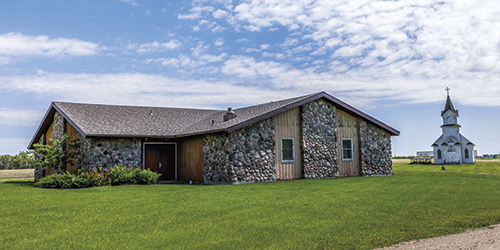
Find authentic German-Russian recipes here!


